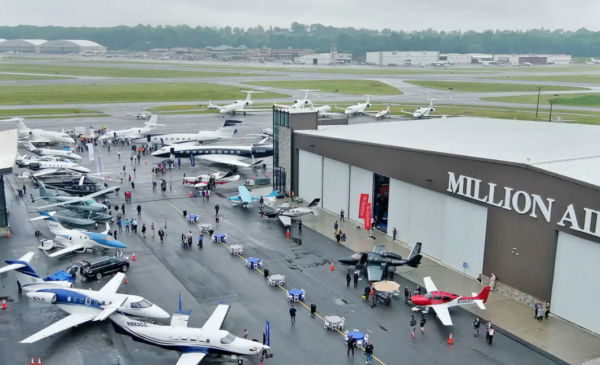NBAA event helps business aviation soar at Westchester
After a hiatus during the height of Covid-19, the National Business Aviation Association (NBAA) returned to Westchester County Airport on June 22 for an NBAA Regional Forum. The event attracted business aircraft owners, operators and representatives from companies that use business aviation as well as others interested in learning what aviation can do for business.
Million Air, a fixed base operator (FBO) at the airport, which operates hangar, fueling and passenger support facilities, hosted the event. There were educational sessions, about 200 exhibitors in Million Air”™s main hangar and outdoor displays of various aircraft.

“We recognize that White Plains is an important area and the facilities are good. It”™s always been a very well-received place for us to host the Regional Forum,” Ed Bolen, president and CEO of the NBAA, told the Business Journals. “We had a strong turnout. The hangar space was sold out and while the weather was damp it was not excessively warm. I don”™t think the weather dampened any spirits.”
Bolen said the registered attendance was more than 3,000. He noted that the meeting sessions covered subjects such as environmental sustainability, career paths in business aviation and the political outlook for the industry.
“Business aviation has always been about getting people where they need to go when they need to go there and doing so safely, securely, flexibly,” Bolen said. “Those benefits have always been understood. What we are seeing as airlines reduce the number of places where they fly and some of their frequencies, business aviation is in some cases becoming the only choice to get to where they have lost service. In some cases, business aviation can be the best mode of transportation. In some cases, it can be the only mode of transportation.”
Bolen said that business aviation has proven to be an important tool for productivity and efficiency.
“We”™ve run studies through the years that showed that top companies routinely utilize business aviation to handle a portion of their transportation challenges,” Bolen said. “The vast majority of the companies that rely upon business aviation are small and midsize companies. At NBAA, over 80% of our members are small and midsize companies typically operating a single aircraft and it”™s often a turboprop or an entry-level business jet.”
Bolen said that business aircraft help users turn travel time into productive work time.
“You can discuss business matters, proprietary business matters without fear of eavesdropping. You can visit multiple cities in a single day. You can move products with you that are maybe too sensitive to go into a cargo hold or too big to go into an overhead bin,” Bolen said. “You can reach communities that don”™t have good airline service.”
Bolen pointed out that it”™s not just airplanes but airports that contribute to the usefulness of aviation for business.

“Airports are enormous economic development tools and we certainly see that in Westchester County and all around the world. Companies often are locating headquarters and facilities based on their ability to access the global marketplaces,” Bolen said. “It”™s an important economic tool for any community and certainly Westchester County is a good example of that.”
Bolen said that the message he delivered during the Regional Forum at Westchester County Airport was about the resilience of the aviation industry, the ability for the industry to evolve and adapt and to do so relying on technology and innovation. He highlighted the industry”™s sustainability programs, including the development of clean aviation fuels and progress being made on electric-powered aircraft. He told attendees that aviation is good for the country because it creates jobs, stimulates economic development and performs humanitarian services. He cited as an example the Corporate Angel Network, which is based at Westchester County Airport and for 40 years has used corporate aircraft to take cancer patients for treatment by specialists in distant cities.
Roger Woolsey, CEO of Million Air, which operates at 31 airports in the U.S. and internationally, views hosting NBAA events as part of the company”™s initiatives to help boost the communities and businesses where it operates. He described their 22,000-square-foot terminal building that opened in 2019, designed with stone, wood, glass, fireplaces and art, as being as welcoming to visitors as it is architecturally impressive.
“We”™re already excited about planning next year”™s NBAA event,” Woolsey told the Business Journals. “We love showcasing so much, we jump at every opportunity. There have been three or four television series and a couple of movies that have filmed scenes at our Westchester site. Presidents of other nations have come through for a tour. We enjoy opening to the community. We like welcoming people to the airport. It”™s obviously good for our business to have a pilot happy to come visit us but we also think it”™s spectacular for a president of another country or dignitaries to use us as an example of a thriving community or something they wish they had in their own country.”

Woolsey said that business and private aviation is misunderstood by many people as being only for the wealthy and giant corporations.
“Businesses, in order to be competitive, need access to aviation to bring in customers, experts and investors,” Woolsey said. “Every aircraft based at Million Air creates so many jobs. The NBAA event was a great way to showcase that.”
Woolsey said that aviation activity at the airport creates a multiplier effect throughout the Westchester County economy that brings business to pilot schools, trade schools, parts suppliers, limousine services, restaurants, hotels and numerous other businesses large and small.
“During Covid, when the world was shut down, airlines were not moving and private aviation was keeping a lot of things going,” Woolsey said. “We know for a fact there were many flights bringing in personal protective equipment and medical team members and medicines. A biosciences company working on the Covid problem used business aviation for its scientists and researchers and to get to Washington for meetings with government officials.”
Woolsey said the benefits of business aviation are being better appreciated by some companies due to the recent upsurge in flight delays and cancellations by the airlines.
“We”™re humble and grateful that we”™re still staying busy,” Woolsey said. “The new facility is just getting lots and lots of compliments. No FBO at Westchester had ever been recognized in the top 100 private aviation terminals. The second year our new Westchester facility opened, we got recognized as the second best FBO in the nation and the most-improved FBO in the world by Professional Pilot magazine. Million Air got voted the number one brand in the industry.”
Woolsey said that Westchester is a very important airport for Million Air as well as being important for the entire region. As the county drafts an updated Airport Master Plan, he urged that people move away from criticism of the airport based on emotion and toward facts about what the airport can and has contributed to the community.
“It”™s historically been one of the top five most important corporate aviation airports that I can remember,” Woolsey said. “We really believe in being a great citizen, neighbor, friend of our communities. For example, our new hangar eliminated over 500 flights a year.”
He explained that before the new 50,000-square-foot hangar was built, some companies had to park their planes at other airports and fly into Westchester to pick up their executives, then fly to their destinations, then return to Westchester to drop off the executives and then fly back to the airport where they were parked.
“With the carbon footprint, everything got cut in half with that hangar for something like 13 aircraft,” Woolsey said. “Last year, because that hangar is heated and state of the art, we did not do a single deicing event on a single aircraft that is based in that hangar.”
He said that not having to deice aircraft elminates the risk of pollution from deicing fluid.
“We”™re hoping that the airport study will look at things like that to decipher between hyperbole, hype and fact. We want what”™s best for the community and nothing less,” Woolsey said.